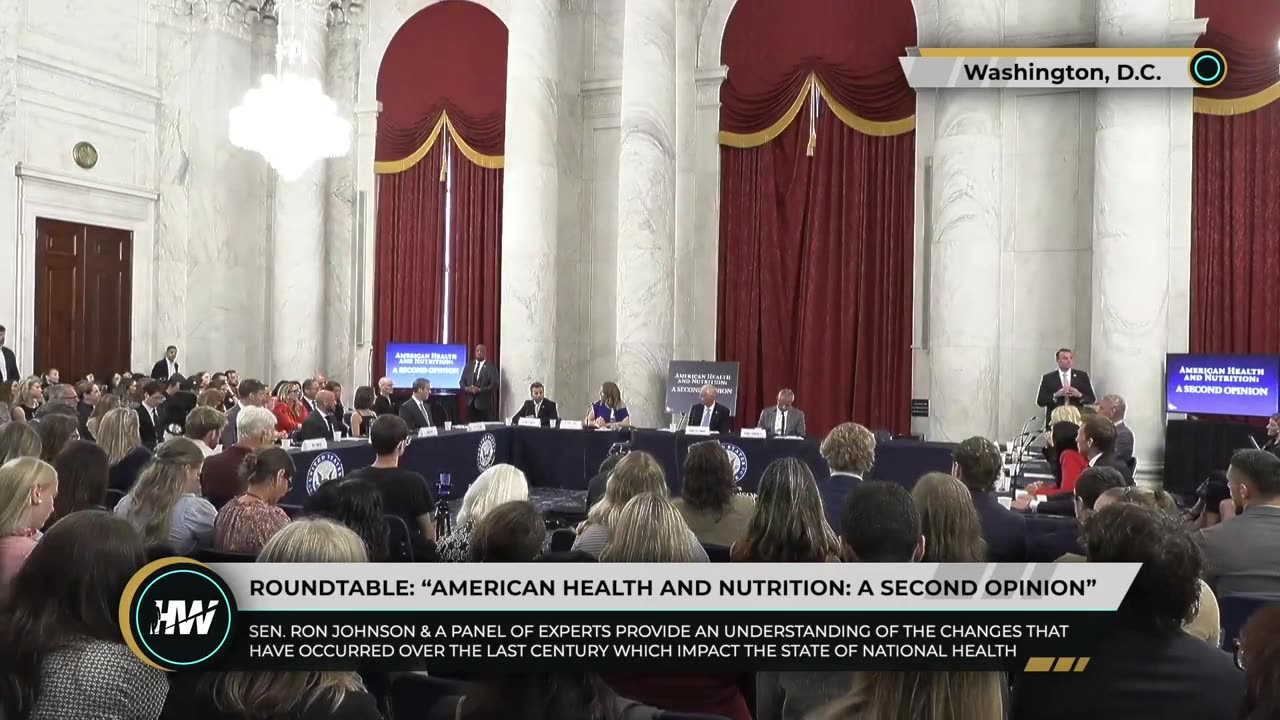Premium Only Content

Excellent speech by dr. Marty Makary
"I'm trained in gastrointestinal surgery. My group at Johns Hopkins does more pancreatic cancer surgery than any hospital in the United States. But at no point in the last 20 years has anyone stopped to ask, why has pancreatic cancer doubled over those 20 years? Who's working on that? Who's looking into it?
We are so busy in our health care system billing and coding and paying each other and every stakeholder has their gigantic lobby in Washington D.C. and everybody's making a lot of money except for one stakeholder, the American citizen. They are financing this giant expense of health care system through their paycheck deduction for health insurance and the Medicare exercise tax as we go down this path of billing and coding and medicating.
And can we be real for a second? We have poisoned our food supply, engineered highly addictive chemicals that we put into our food. We spray it with pesticides that kill pests. What do you think they do to our gut lining and our microbiome? And then they come in sick. The GI tract is reacting. It's not an acute inflammatory storm. It's a low grade chronic inflammation. And it makes people feel sick and that inflammation permeates and drives so many of our chronic diseases that we didn't see half a century ago.
Who's working on it? Who's looking into this? Who's talking about it? Our health care system is playing whack-a-mole on the back end and we are not talking about the root causes of our chronic disease epidemic. We can't see the forest from the trees sometimes. We're so busy in these short visits, billing and coding. We've done a terrible thing to doctors. We've told them put your head down, focus on billing and coding. We're gonna measure you by your throughput. And good job, you did a nice job. We have all these numbers to show for it.
Well, the country is getting sicker. We cannot keep going down this path. We have the most over-medicated, sickest population in the world. And no one is talking about the root causes. The Pima Indians are the perfect example. Here is a group where the obesity diabetes rate was less than 1%. The land in New Mexico and Arizona had its rivers supplied, diverted by ranchers and settlers, and the land and the soil was destroyed. The government, recognizing this tremendous injustice, started to send free government food, but it wasn't organic kale and fruit and vegetables, it was processed and junk food. Instantly, the Pima Indians developed an obesity, diabetes rate of 90 percent. And what did the United States government do? What did our health care system do? The NIH dispatches its researchers to draw the blood of the Pima Indians to look for a gene that predisposes them to obesity and diabetes. What are our leaders doing?
The H in NIH is supposed to stand for health. Where are they spending their money on food as medicine and looking at the estrogen binding properties of pesticides that are driving our fertility rates down? They're funding research in Wuhan, China, and they're funding research on a new food compass to replace the misinformation they put out with the food pyramid, telling us lucky charms is healthier than steak. Somebody has got to speak up.
Maybe we need to talk about school lunch programs not just putting every kid on obesity drugs like Ozempic. Maybe we need to talk about treating diabetes with cooking classes, not just throwing insulin at everybody. Maybe we need to talk about environmental exposures that cause cancer, not just the chemo to treat it. We've gotta talk about food as medicine and research these areas. 20% of our nation's kids are on medication. And as you heard, half are obese or overweight. Are they more disobedient than children in Japan or have we poisoned the food supply? Is this a chronic disease epidemic that has been a direct result of what adults have done to children?
We like to blame people for their diseases, but maybe we need to look inward. We see all these shiny objects thrown at us. Politicians talk about, oh, we've got a new healthcare proposal. Medicare can now negotiate the prices of ten generic drugs. Don't be fooled. These are things in the periphery. It's not to say they don't have merits, but the proposed program savings in year one by their own description is six billion dollars. In a four point five trillion dollar economy that's expanding at eight percent per year in the commercial sector, that's a two hundred billion dollar expansion, we save six billion dollars. The best way to lower drug costs in the United States are to stop taking drugs we don't need."
-
 LIVE
LIVE
Badlands Media
9 hours agoDevolution Power Hour Ep. 358
10,282 watching -
 2:55:04
2:55:04
TimcastIRL
3 hours agoFBI & GOP EXPOSE "Coup" Against TRUMP, Democrat Operative FELONIES Covered Up | Timcast IRL
179K39 -
 DVR
DVR
Man in America
10 hours ago5G + mRNA = Remote-Controlled Humanity w/ Dr. Henry Ealy
10.3K7 -
 LIVE
LIVE
Geeks + Gamers
3 hours agoGEEKS + GAMERS PLAY- MARIO KART!! SWITCH 2 HYPE!
463 watching -

Badlands Media
21 hours agoAltered State Ep. 30
39.5K5 -
 LIVE
LIVE
Meisters of Madness
6 hours agoElden Ring - Erdtree Wrap-up
248 watching -
 9:22:21
9:22:21
Bitcoin Magazine
2 days agoThe Bitcoin Conference 2025 | Day 2 Livestream
157K21 -
 LIVE
LIVE
Eternal_Spartan
1 hour agoLive - Eternal_Spartan | Doom: The Dark Ages | Come Join the Best Rumble Community There Is!!
381 watching -
 9:27:07
9:27:07
Dr Disrespect
11 hours ago🔴LIVE - DR DISRESPECT - BATTLEFRONT 2 - TRIPLE XP MADNESS
111K13 -
 1:24:28
1:24:28
Joker Effect
2 hours agoHUGE ANNOUNCEMENT come listen
10.3K2